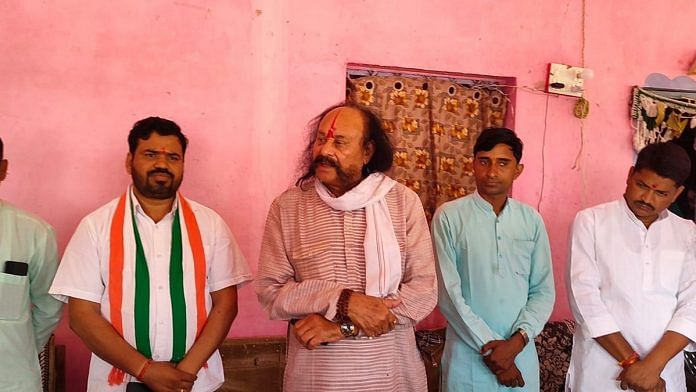Karera: With a blazing tilak on his forehead and a broad moustache sweeping his cheeks, the towering 81-year-old Malkhan Singh, once a dreaded dacoit in Chambal, is tapping into his more convivial Robin Hood persona as he campaigns for the Congress party in poll-bound Madhya Pradesh.
Dressed in a humble brown kurta-pajama, with a white scarf around his neck, he sits on the front seat of his Bolero as his convoy— complete with a blaring DJ set — makes its way into Khirya, a Thakur-dominated village in Shivpuri district.
Embossed lettering on the windshield of his car announces his identity: “Thakur Malkhan Singh (Daddaji) Chambal”. As the vehicle enters the village from state highway-3, dust blows in. He rolls up the window and laments the poor state of village roads.
The MP Congress has tasked Malkhan Singh with campaigning in the Thakur-dominated Gwalior-Chambal region, encompassing 34 assembly seats. At least 20 out of the 34 seats have a sizable Thakur electorate, including the Parihar clan to which Malkhan Singh belongs.
Earlier this week, in Bhind, Malkhan escorted the leader of the opposition Dr Govind Singh to file his nomination at the collectorate. His visit to Khirya village is aimed at consolidating the Parihar votes in favour of Pragilal Jatav, the incumbent Congress MLA from Karera, a reserved Scheduled Caste seat. For this constituency, Thakurs play king-makers.
Malkhan’s first stop in Khirya is the home of Ram Manohar Parihar, a Congress-affiliated sarpanch of the village who passed away recently. His car screeches to a halt in front of the house and he emerges to deliver a speech.
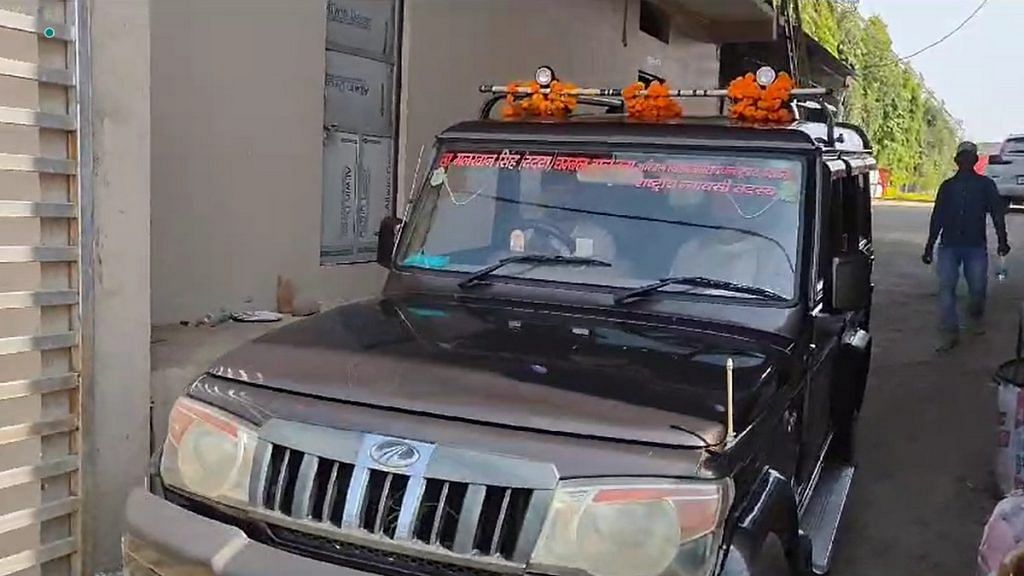
“Kshatriyas are people of their words. They always stand against injustice. And this election is not just between the BJP and the Congress but a fight against inequality and injustice,” he says.
Malkhan Singh is not new to Karera and its voters. He unsuccessfully contested assembly polls twice from Karera, in 1998 and 2003. In the latter outing, he finished in fourth place, with about 14,000 votes largely from the Thakur and Gurjar communities.
Since his release from prison in 1989, Malkhan Singh has shifted his political allegiances several times. In the 1990s, he joined the Samajwadi Party, in the 2014 Lok Sabha elections, he campaigned in support of Narendra Modi, and in the 2017 UP assembly elections, he supported RLD’s Ajit Singh. In the 2018 assembly elections in MP, he campaigned for the BJP.
But in August 2023, Malkhan switched his loyalties and moved to the Congress in the presence of state party chief Kamal Nath.
“I must say, the Congress is the only party that thinks of the marginalised,” Malkhan tells ThePrint.
But the ‘bandit king’ never achieved the political prominence of the likes of ‘bandit queen’ Phoolan Devi, who was a Samajwadi Party MP at the time she was shot dead in 2001.
“Malkhan always harboured an ambition to become a politician but unlike other bandits like Phoolan Devi, he has not had much electoral success,” points out Rakesh Achal, an author and journalist from Gwalior who has written a book about the region’s history of dacoity. But that being said, Malkhan still has a following in the Chambal region.
Also Read: How Phoolan Devi’s fortune changed during the prime of Mandal-Kamandal politics in UP
‘Baagi, not dacoit’
Malkhan shuns the label of a dacoit and prefers to be called a “baagi” or rebel. The way he tells it, he resorted to violence as the only means to combat prevailing injustice in society.
However, during his prime, he gained a fearsome reputation.
According to reports, Malkhan Singh had his first case registered against him under the Arms Act when he was still in his teens. He surpassed his notoriety as a local troublemaker not long afterward when he assembled a gang of around 40 members in the lawless Chambal ravines.
In the 1970s, this gang operated across Bhind and Datia in Madhya Pradesh, and Jalaun, Agra, and Etawah in Uttar Pradesh. It reportedly accumulated a total of 94 cases, including 18 dacoities, 28 kidnappings, 19 attempted murders, and 17 murders, according to police records.
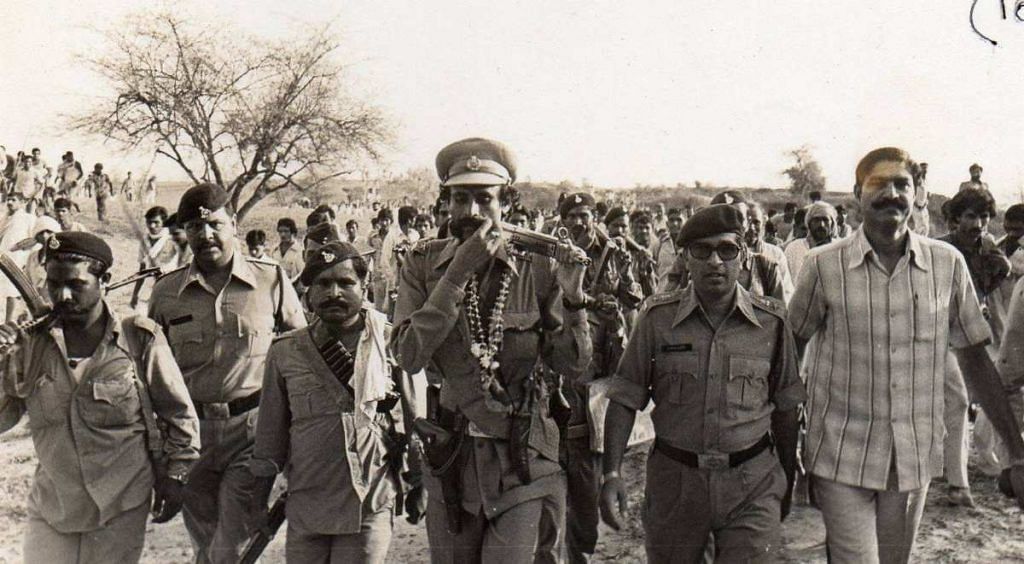
A major incident in this period took place in May of 1976, when Malkhan allegedly pumped six bullets into Kailash Narayan, sarpanch of Bilao village, over a fight pertaining to a land parcel near the local temple. Narayan survived, but the animosity lingered on.
However, unlike some other dacoits, including Phoolan Devi, Malkhan wasn’t known for indiscriminate killings.
“Malkhan never murdered recklessly. He set the trend of kidnapping people for ransom, but murder was only in extreme cases of enmity or that of a snitch,” says Rakesh Achal.
Through the years, Malkhan’s enmity with Kailash Narayan continued to simmer, but here too he is said to have drawn a line.
When his gang members seized Kailash Narayan’s children and took them to the ravines at one point, Malkhan Singh was not happy, according to his grandson Vijay Singh.
“After Daddaji saw them, he not only scolded the gang members but also touched the feet of Kailash Narayan’s daughter. He was of the opinion that enmity is against Kailash and not his family,” Vijay tells ThePrint.
Finally, in June 1982, at a grand ceremony reportedly attended by 30,000 people in MP’s Bhind, Malkhan Singh laid down his arms before then Chief Minister Arjun Singh. He spent seven years in prison, before being released in 1989.
According to Vijay, the last case against his grandfather, involving the attempted murder of Kailash Narayan, concluded in 2013 with Malkhan’s acquittal due to lack of evidence.
As for Malkhan, he prefers to not dwell on the past.
“What is done is done. The government resolved the property dispute that had pushed me to pick up arms. There is no point talking about it. But the sad part is that I still remain a dacoit for people while no one says anything about the dacoits sitting in Parliament,” he says.
Robin Hood image
Malkhan Singh always made a deliberate effort to cultivate an image of a Robin Hood, according to Achal. This included providing financial assistance to impoverished villagers, particularly during the weddings of their daughters, which helped earn him support in the Chambal region.
When asked about his switch to politics after surrendering arms, Malkhan offers a sharp retort: “Why don’t people go and ask the Prime Minister why he entered politics when he was selling tea? Or why does no one ask Shivraj Singh Chouhan why he entered politics when he was the son of a school master?”
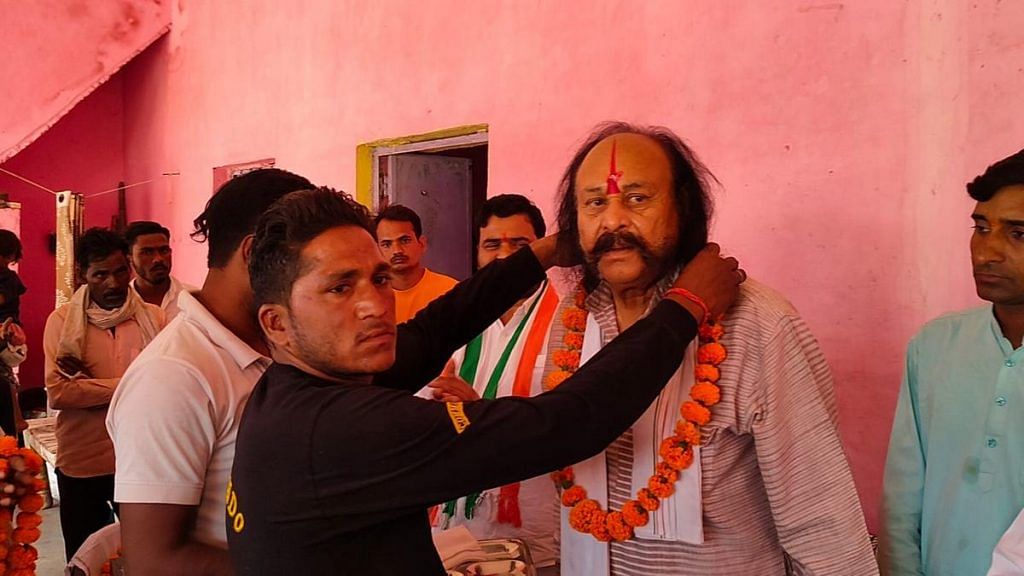
He cites the injustice suffered by the people around him under the incumbent BJP government in MP as the trigger that pushed him to join the Congress.
“I recently met a young man who met with a bike accident, but the police did not register his complaint. People are suffering, their land is being grabbed by corrupt politicians. This is what made me quit the BJP and join the Congress party to truly work for the poor,” Malkhan says.
Last year, the former dacoit’s second wife, Lalita Rajput was elected unopposed as the sarpanch of Singayai panchayat of Aaron village in Guna.The couple lives there with their three children.
MP | Ex-dacoit from Chambal region Malkhan Singh's wife elected sarpanch unopposed from Singayai panchayat of Aaron in Guna district
I want to make sure that facilities like power, water, and roads should be present in our village; I want to develop my village, says Lalita. pic.twitter.com/fNGRrdRhtW
— ANI MP/CG/Rajasthan (@ANI_MP_CG_RJ) June 12, 2022
At Khirya, Malkhan gives a patient hearing to the residents as they complain about the lack of development in the region under MLA Pragilal Jatav, with roads in poor shape and erratic electricity.
“The Congress was not in power, but now they will form the government and then the man you elect can also become a minister and bring development to the region. Ve punjipath log hai, bhookhe nange nahi hai (They are wealthy people, not naked and hungry),” says Malkhan to a group of villagers who surround him under a banyan tree.
He also tells the people that the BJP came to power by “purchasing” MLAs— a reference to the Congress coming to power in 2018 only for the government to fall just over a year later after Jyotiraditya Scindia and 18 MLAs defected to the BJP.
Listening to Malkhan’s appeal, villagers assure him of their support for Pragilal Jatav, stating that his visit has made all the difference to them.
For some like Dinesh Gurjar, a resident of nearby Khurri village, Malkhan Singh is a good man who took to dacoity to fight against atrocities.
“Malkhan Singh had contested and lost with a narrow margin from Karera, and people here know him. He picked up arms for the good fight and betterment of society and people here listen to him,” Gurjar says.
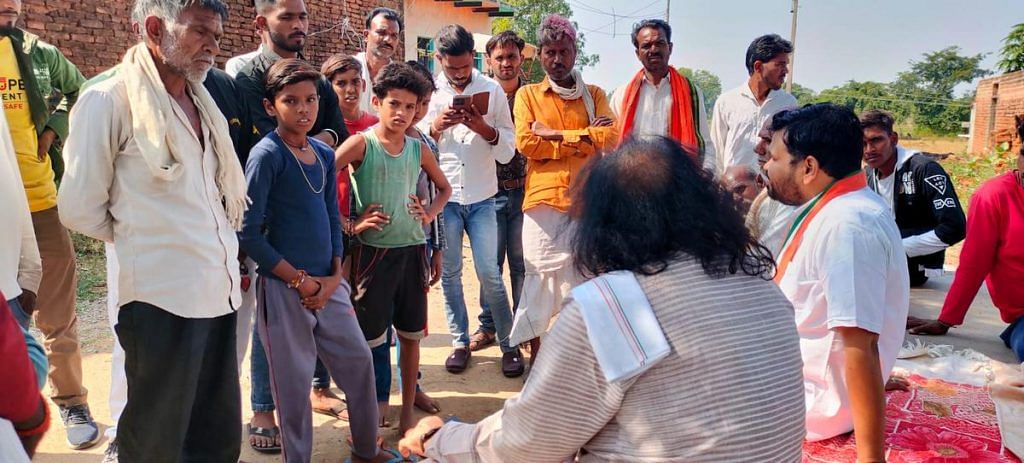
Diminishing influence?
While many other dacoits chose a quiet life post-surrender, Malkhan remained active in public life, switching political loyalties but never fading into obscurity.
For the Congress, Malkhan is a relevant player in politics because of the local influence he still wields.
“He has an impact on the people belonging to the Parihar community, which has votes across the Gwalior-Chambal region. In some areas, (the Parihar vote) is crucial for candidates, especially in closely contested fights,” explains Dharmendra Sharma, spokesperson for the Congress committee in the Gwalior-Chambal region.
Sharma adds that Malkhan Singh is actively campaigning for the Congress in various districts including Guna, Ashok Nagar, Datia, Shivpuri, Gwalior, and Bhind. He also holds small sabhas or gatherings for the Parihar community across various villages and visits any constituency in the Gwalior-Chambal region on request of a particular Congress candidate.
However, some argue that Malkhan’s influence is waning in the current political landscape.
“There was a time when dacoits were an attraction for people in Gwalior-Chambal, but that time has passed long ago. The Congress would usually get the upper hand by riding on caste-based tensions here, but that’s not how it is now,” says Jaibhan Singh Pawaiya, a senior leader of the BJP in Gwalior-Chambal.
“Today, elections won’t be decided by caste equations but the development work under taken by Chief Minister Shivraj Singh Chouhan under the leadership of Prime Minister Narendra Modi,” he adds.
Lokendra Prashar, BJP’s state secretary and a Gwalior-Chambal leader, also takes a jab at Malkhan. “Many people who gain popularity for other reasons, feel they can make it big in politics as well, but it does not work out like that,” he says. “In the upcoming election, it will be clear when people vote.”
(Edited by Asavari Singh)


